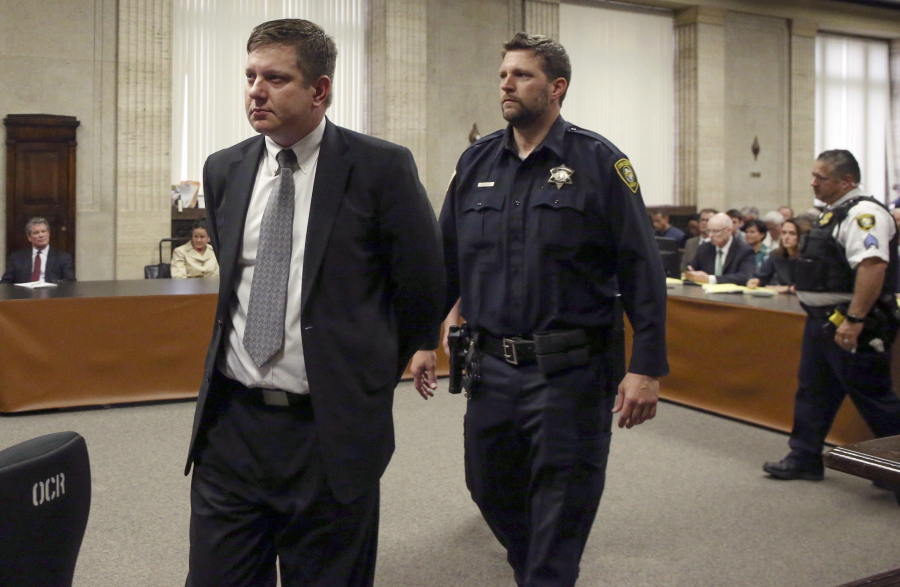CHICAGO — A white Chicago officer was convicted of second-degree murder Friday in the 2014 shooting of a black teenager that was captured on shocking dashcam video that showed him crumpling to the ground in a hail of 16 bullets as he walked away from police.
The video, some of the most graphic police footage to emerge in years, stoked outrage nationwide and put the nation’s third-largest city at the center of the debate about police misconduct and use of force. The shooting also led to a federal inquiry and calls to reform the Chicago Police Department.
Jason Van Dyke, 40, was the first Chicago officer to be charged with murder for an on-duty shooting in about 50 years. He was taken into custody moments after the verdict was read.
The second-degree verdict reflected the jury’s finding that Van Dyke believed his life was in danger but that the belief was unreasonable. The jury also had the option of first degree-murder, which required finding that the shooting was unnecessary and unreasonable. A first-degree conviction, with enhancements for the use of a gun, would have carried a mandatory minimum of 45 years.
Second-degree murder usually carries a sentence of less than 20 years, especially for someone with no criminal history. Probation is also an option. Van Dyke was also convicted of 16 counts of aggravated battery — one for each bullet.
One legal expert predicted that Van Dyke will be sentenced to no more than six years total. But because he’s an officer, it will be “hard time,” possibly spent in isolation, said Steve Greenberg, who has defended clients at more than 100 murder trials.
Laquan McDonald, 17, was carrying a knife when Van Dyke fired at him on a dimly lit street where he was surrounded by other officers.
One of Chicago’s leading civil rights attorneys said the conviction sends a message to minority communities that the police reforms that began after the video became public were not just for show.
Andrew Stroth said an acquittal would have sent the opposite message, dashing hopes for change.
“I think Chicago would have erupted,” he said.
Defense attorney Dan Herbert called Van Dyke “a sacrificial lamb” offered by political and community leaders “to save themselves.” He said it was a “sad day for law enforcement” because the verdict tells officers they cannot do their jobs.
“Police officers are going to become security guards,” he said.
A McDonald family spokesman thanked prosecutors for pursuing a case that, he said, many black attorneys did not believe could be won.
“I can’t rejoice because this man is going to jail,” said McDonald’s uncle, the Rev. Marvin Hunter. “I saw his wife and father. His wife and daughter didn’t pull the trigger. I could see the pain in these people. It bothered me that they couldn’t see the pain in us.”
The verdict was the latest chapter in a story that accelerated soon after a judge ordered the release of the video in November 2015.
The 12-person jury included one African-American member, although blacks make up one-third of Chicago’s population. The jury also had seven whites, three Hispanics and one Asian-American.
Jurors said they spent much of their deliberations discussing whether to convict on first-degree or second-degree murder, not an acquittal. They said Van Dyke’s testimony did not help him. One woman said he “messed up” and should not have testified.
The jurors’ names were not made public during the trial and were not disclosed Friday during interviews with reporters at the courthouse.
One said Van Dyke needed to “contain the situation, not escalate it.” He said the jury settled on second-degree murder because Van Dyke believed he was experiencing a real threat.
On the night of the shooting, officers were waiting for someone with a stun gun to use on the teenager when Van Dyke arrived, according to testimony and video.



